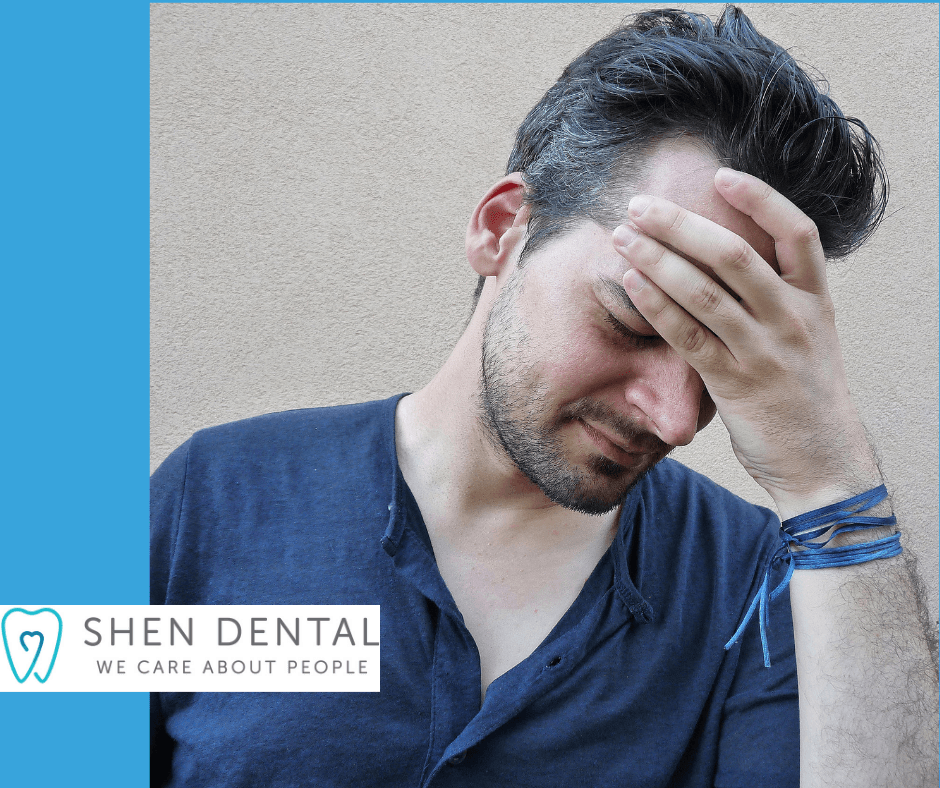Clenching, or grinding of teeth, is also known as Bruxism. It occurs most often at night and is common among adults and children. Most of us grind our teeth from time to time, but up to 1 in 20 people will suffer from chronic bruxism. In Canada, about 8% of adults and 14% of children grind their teeth during the night.
HOW WOULD YOU KNOW IF YOU GRIND YOUR TEETH DURING THE NIGHT?
The best way is simply to ask your sleep partner. If you suffer from morning pain in of the muscles of the jaw, neck muscle, jaw joints, difficulty opening the mouth after waking, or an unexplained headache, you may grind or clench your teeth while sleeping.
Let’s do a small experiment: while reading this post, please stop for a moment and check, do your teeth touch each other? If you answered yes, you may have teeth clenching or bruxism.
While the causes of the phenomenon are not known for certain, but many factors were suggested, such as anxiety, very brief, intense awakenings from sleep, sensitivity to brain chemicals (dopamine). Stress, anxiety and other psychological factors were once considered the major cause of teeth clenching and grinding. While it is true that in some people stress is associated with an increase in teeth grinding, perhaps the main issue is that the awareness increases during periods of anxiety and stress, and not the grinding itself.
A more recent theory is that this a sleep-related chewing activity associated with the effort to maintain open airway while sleeping. For example, a person having sleep apnea, meaning having short pauses in breathing during the sleep, is also more likely to have bruxism.
Young people are more likely to have night grinding, as well as those with higher education, smokers and heavy users of caffeine and alcohol.
WHY SHOULD YOU TREAT THIS CONDITION?
One good reason is a headache and other symptoms if you have them. But even if you do not feel it, night (and day) grinding can hurt your teeth badly. While you can read some horror stories on the internet, let us summarize these effects for you:
- If you grind your teeth, you could cause a broken or cracked tooth
- If you grind your teeth, you could cause damage to dental prostheses such as crown, bridges, veneers, fillings. You really do not want these broken after all the time and money invested in them.
- Grinding your teeth could cause problems with your jaw joint (temporomandibular joint), and these are really difficult to treat.
- Grinding your teeth will cause damage to your teeth. Not only it will affect the way you chow your foods it also increases your susceptibility to decay. And no one likes getting fillings!
- Some believe that continuous grinding of your teeth, especially if you have gum disease, may cause the decrease of your jaw bone, and no one wants that!
The damage may be irreversible over time. The good news is that awareness of the problem greatly improves the chances of solving it.
Let us help you, book your appointment today!
WHAT CAN WE DO FOR YOU?
Our dentists will listen to your story and ask you a few questions. Next, they will examine your teeth and your overall oral health. They will look for signs that you are indeed grinding your teeth. They will look for hypersensitive teeth, aching jaw muscles, headaches, signs of dental wear and damage to crowns, bridges, and fillings.
Dental wear is deterioration of your tooth as a result of use. Because when you grind, you are overusing your teeth, these signs will develop earlier. This will affect first the tooth enamel which is the thin outer covering of the tooth. It is very important in protecting your teeth from daily use such as chewing, biting, crunching, and grinding. When it becomes thinner due to grinding, you will have sensitivity to sweets, cold, or warm, or even constant pain and your teeth may appear yellow. Overall, this tooth will become more susceptible to cavities or tooth decay.
If you are suffering from night grinding, we will suggest a night guard. Most cases of bruxism can easily be treated by wearing a night guard while you sleep. This is a small device that will be prepared especially for you that will protect your teeth, and sometimes even break this habit. Night guards work by putting a barrier between your upper jaw and lower jae. When you clench your jaw, the night guard helps to lighten the tension and give cushion to the muscles in the jaw. This cushioning not only helps to prevent face and jaw pain, but also protects the enamel of your teeth. Doesn’t it worth it?
How is this done? First, your dentist will make an impression of your teeth. This impression will be sent to a professional dental laboratory, where a night guard is molded over the model using a special material. Using the special material and spending extra time and will provide a guard with the most comfort and protection.
Let us help you, book your appointment today!
Taking care of your night guard is no big deal. While you do not need to brush it to prevent decay, we do recommend keeping it clean, to avoid bad odors and bacteria growth. You may want to brush it using toothpaste or soap and put it in a sterilizing solution from time to time (you can use bleach or a specific solution you could get in any pharmacy.
If you have a night guard, do not forget to bring it with you for every dental appointment. First, the dentist will check for any cracks and make sure it fits well. Also – if you need fillings in your mouth, it is a good practice to make sure that the nightguard still fits once the treatment was completed!
We collected a few resources for you!
You can watch a short video and an article about tooth grinding, clinching, and bruxism.
You may also want to look at our previous blog posts about dental causes of headache, cracked tooth and teeth accidents.






